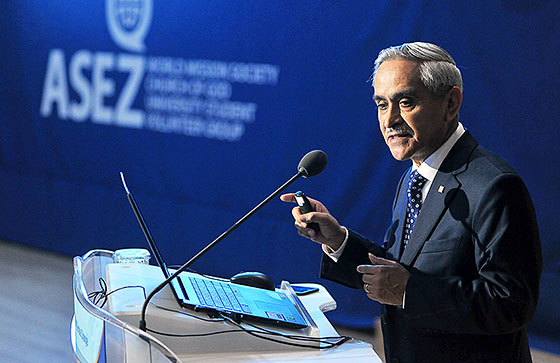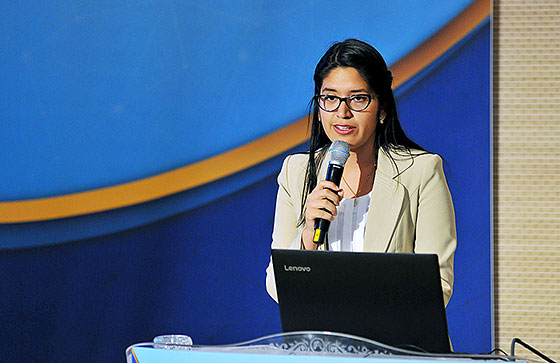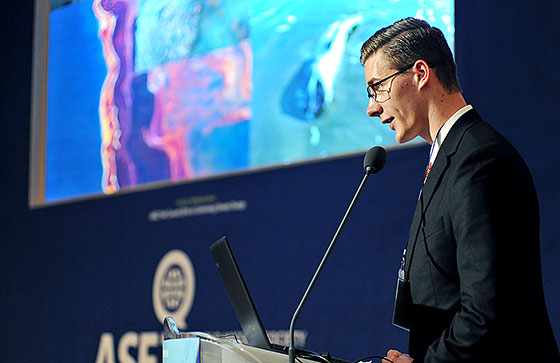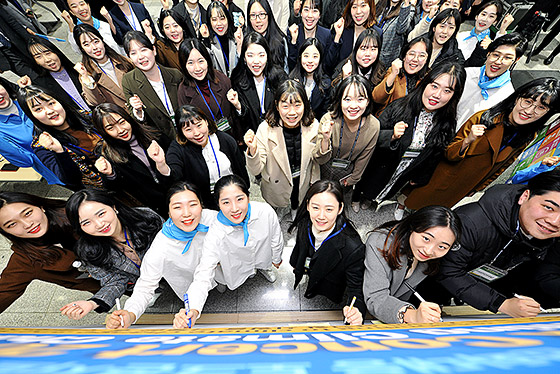Select a Language
ASEZ Talk Concert on Confronting Climate Change 2018
South Korea
11,245 viewsMami Mizutori, the Head of the United Nations Office for Disaster Risk Reduction [UNISDR], said through its report in October that “economic losses from extreme weather events are unsustainable.” This is why experts point out that the international community altogether should actively participate in combating environmental problems.
On November 11, the Church of God held ASEZ Talk Concert on Confronting Climate Change 2018 at a seminar room of the New Jerusalem Pangyo Temple in Korea to draw global attention to climate change and to share creative visions and opinions of university students who are the leaders of the future generations. Duberlí Apolinar Rodríguez Tineo, Supreme Judge of the Judicial Power of Peru, who had attended ASEZ Global Forum in Peru, came to Korea as the speaker at the event. Around 600 ASEZ World Mission Society Church of God University Student Volunteer Group members from Korea, U.S., South Africa, Philippines, and Peru attended the talk concert.


Beginning the event, General Pastor Kim Joo-cheol prayed that blessings would be bestowed upon the students who endeavor to restore the original state of the earth which was beautiful in times of God’s creation.
“The way to salvation was opened through the sacrifice of one man, Jesus Christ, 2,000 years ago. Each and every university student with passion, intelligence, and love for mankind given by God will change the world to be hopeful and beautiful,” he encouraged them in his opening address.
The Talk Concert was on the response to climate change and the role of university students. Tineo, Supreme Judge of the Judicial Power of Peru and Goodwill Ambassador of the Organization of American States for Environmental Justice, pointed out during his lecture that greenhouse gases were the cause of climate change. The Amazon rainforest, called the lungs of the earth, are being destroyed at a rapid rate, and therefore less carbon dioxide is absorbed, leading to greater damages to the earth. To solve such problems, he suggested that the reduction of carbon dioxide emission should be legislated, explaining the cases of South American countries like Uruguay and Costa Rica. “All of you should cut down the use of fossil fuel that emits greenhouse gases, and make efforts to study renewables and use them,” he added a detailed action plan for the students.


Then, the university students started their presentations. ASEZ members from the U.S., South Africa, and Peru sought their roles as university students by presenting on their environmental awareness raising activities through seminars, forums, fairs, campaigns, and cleanups in cooperation with environmental groups to deal with climate disasters such as droughts, heat waves, and heavy rains that their countries suffered.
As a side event, the exhibition panels were displayed to introduce the activities of ASEZ and the seriousness of climate change. The university students who looked around the exhibition wrote down witty ideas to practice on the panels such as “Separate collection,” “No more standby power. Let’s unplug devices when not used!” “Use public transportation. I will walk!” “Wear multiple layers of clothes,” “Pay attention to the environmental engineering class,” and “Earth, I love you! ASEZ will protect you.”




Brother Alexander from San Diego, CA, U.S., gave a presentation, Issue of the Millennials. “The environmental problems that we are facing cannot be solved by a person or a government. All of us should take actions. Since it is important to find out problems by sharing information and to know the solutions, I want to deliver the message that the time for us, university students, to gather our strength and take action is now,” he said.
ASEZ carries out many activities in all directions with the love of a mother who takes care of the family, thinking of the future of the global environment and mankind. It is extending its range of activities by building partnerships with the UN, governments, and international organizations. The international society pays attention to its next step.

- ASEZ made a speech at the UN Headquarters on the International Day for Tolerance
- November 16 is the International Day for Tolerance that the UN has declared. It has the meaning of opening the way to peace and coexistence by understanding and respecting others beyond ethnicity, gender, nationality, religion, and physical disability.
- In this year, which marks the 70th anniversary of the Universal Declaration of Human Rights, about 100 ASEZ members participated in the ceremony Creators for Change held by the UN and the YouTube to commemorate the International Day for Tolerance. A contest of introduction video for the Universal Declaration of Human Rights was held for 15–24-year-old students, and the best four works were selected, and 750 university students were invited. Among them, the ASEZ members were also on the list. The UN Department of Public Information [DPI], the UN Office of the United Nations High Commissioner for Human Rights [OHCHR], YouTube officials, and video producers also participated in the ceremony.
- Sister Aurora Sainez from San Diego, CA, U.S., a ASEZ member, illuminated the prohibition of discrimination in the Universal Declaration of Human Rights (Article 2) and the right to work freely (Article 23) through a video made by herself and other members. “I think when we reveal the problems and educate people, it will bring change,” she said. She urged the participants to work together in the matter by introducing the efforts of ASEZ to make a world without discrimination in human rights, welfare, and the environment.